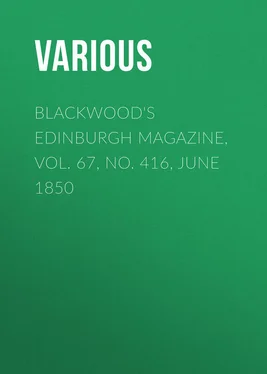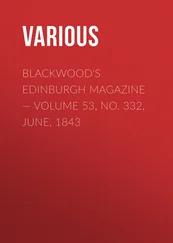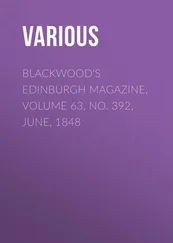Various - Blackwood's Edinburgh Magazine, Vol. 67, No. 416, June 1850
Здесь есть возможность читать онлайн «Various - Blackwood's Edinburgh Magazine, Vol. 67, No. 416, June 1850» — ознакомительный отрывок электронной книги совершенно бесплатно, а после прочтения отрывка купить полную версию. В некоторых случаях можно слушать аудио, скачать через торрент в формате fb2 и присутствует краткое содержание. Издательство: Иностранный паблик, Жанр: periodic, foreign_edu, Путешествия и география, на английском языке. Описание произведения, (предисловие) а так же отзывы посетителей доступны на портале библиотеки ЛибКат.
- Название:Blackwood's Edinburgh Magazine, Vol. 67, No. 416, June 1850
- Автор:
- Издательство:Иностранный паблик
- Жанр:
- Год:неизвестен
- ISBN:нет данных
- Рейтинг книги:5 / 5. Голосов: 1
-
Избранное:Добавить в избранное
- Отзывы:
-
Ваша оценка:
- 100
- 1
- 2
- 3
- 4
- 5
Blackwood's Edinburgh Magazine, Vol. 67, No. 416, June 1850: краткое содержание, описание и аннотация
Предлагаем к чтению аннотацию, описание, краткое содержание или предисловие (зависит от того, что написал сам автор книги «Blackwood's Edinburgh Magazine, Vol. 67, No. 416, June 1850»). Если вы не нашли необходимую информацию о книге — напишите в комментариях, мы постараемся отыскать её.
Blackwood's Edinburgh Magazine, Vol. 67, No. 416, June 1850 — читать онлайн ознакомительный отрывок
Ниже представлен текст книги, разбитый по страницам. Система сохранения места последней прочитанной страницы, позволяет с удобством читать онлайн бесплатно книгу «Blackwood's Edinburgh Magazine, Vol. 67, No. 416, June 1850», без необходимости каждый раз заново искать на чём Вы остановились. Поставьте закладку, и сможете в любой момент перейти на страницу, на которой закончили чтение.
Интервал:
Закладка:
"To examine this recipe of a Parliament, how fit it is for governing Nations, nay, how fit it may now be, in these new times, for governing England itself where we are used to it so long: this, too, is an alarming inquiry, to which all thinking men, and good citizens of their country, who have an ear for the small still voices and eternal intimations, across the temporary clamours and loud blaring proclamations, are now solemnly invited. Invited by the rigorous fact itself; which will one day, and that perhaps soon, demand practical decision, or redecision of it from us, – with enormous penalty if we decide it wrong. I think we shall all have to consider this question, one day; better perhaps now than later, when the leisure may be less. If a Parliament, with suffrages and universal or any conceivable kind of suffrages, is the method, then certainly let us set about discovering the kind of suffrages, and rest no moment till we have got them. But it is possible a Parliament may not be the method! Not the whole method; nor the method at all, if taken as the whole? If a Parliament with never such suffrages is not the method settled by this latter authority, then it will urgently behove us to become aware of that fact, and to quit such method; – we may depend upon it, however unanimous we be, every step taken in that direction will, by the Eternal Law of things, be a step from improvement, not towards it."
Was there ever so tantalising a fellow? We only know of one parallel instance. Sancho, after a judicial hearing at Barrataria, sits down to dinner, but every dish upon which he sets his fancy is whisked away at the command of a gaunt personage stationed on one side of his chair, having a wholesome rod in his hand. Fruit, meat, partridges, stewed rabbits, veal, and olla-podrida, vanish in succession, and for the removal of each some learned reason is assigned by the representative of Esculapius. We give the remainder of the anecdote in the words of Cervantes. "Sancho, hearing this, threw himself backward in his chair, and, looking at the doctor from head to foot, very seriously, asked him his name, and where he had studied. To which he answered: 'My Lord Governor, my name is Doctor Pedro Rezio de Aguero; I am a native of a place called Tirteafuera, lying between Caraquel and Almoddobar del Campo on the right hand, and I have taken my doctor's degree in the University of Ossuna.' 'Then hark you,' said Sancho in a rage, 'Signor Doctor Pedro Rezio de Aguero, native of Tirteafuera, lying on the right hand as we go from Caraquel to Almoddobar del Campo, graduate in Ossuna, get out of my sight this instant – or, by the light of heaven! I will take a cudgel, and, beginning with your carcase, will so belabour all the physic-mongers in the island, that not one of the tribe shall be left! – I mean of those like yourself, who are ignorant quacks; for those who are learned and wise I shall make much of, and honour, as so many angels. I say again, Signor Pedro Rezio, begone! or I shall take the chair I sat on, and comb your head with it, to some tune, and, if I am called to an account for it, when I give up my office, I will prove that I have done a good service, in ridding the world of a bad physician, who is a public executioner.'"
Mr Carlyle, though he may not be aware of it, is even such a political doctor. He despises De Lolme on the British Constitution, and peremptorily forbids his patient to have anything to do with that exploded system. "I should like to have," says the pupil placed under his charge, "in the first place, a well-regulated constituted monarchy." "'Tis a sham!" cries Signor Doctor Thomas Carlyle – "Are solemnly constituted Impostors the proper kings of men? Do you think the life of man is a grimacing dance of apes? To be led always by the squeak of a paltry fiddle? Away with it!" The wand is waved, and constitutional monarchy disappears. "Well then," quoth the tyro, "suppose we have an established Church and a House of Peers?" "Avaunt, ye Unveracities – ye Unwisdoms," shrieks the infuriated graduate. "What are ye but iniquities of Horsehair? O my brother! above all, when thou findest Ignorance, Stupidity, Brute-mindedness, – yes, there, with or without Church-tithes and Shovelhat, or were it with mere dungeons, and gibbets, and crosses, attack it, I say; smite it wisely, unweariedly, and rest not while thou livest and it lives! Instead of heavenly or earthly Guidance for the souls of men, you have Black or White Surplice Controversies, stuffed Hair-and-leather Popes; – terrestrial Law-words, Lords, and Lawbringers organising Labour in these years, by passing Corn Laws. Take them away!" "What say you to the House of Commons, doctor?" "Owldom! off with it." "A Democracy?" "On this side of the Atlantic and on that, Democracy, we apprehend, is for ever impossible." "And why will none of these things do?" "Because," quoth the graduate with a solemn aspect, "you perceive we have actually got into the New Era there has been such prophesying of: here we all are, arrived at last; – and it is by no means the land flowing with milk and honey we were led to expect! very much the reverse. A terrible new country this: no neighbours in it yet, that I can see, but irrational flabby monsters (philanthropic and other) of the giant species; hyænas, laughing hyænas, predatory wolves; probably devils , blue (or perhaps blue-and-yellow) devils, as St Guthlac found in Croyland long ago. A huge untrodden haggard country, the chaotic battlefield of Frost and Fire, a country of savage glaciers, granite-mountains, of foul jungles, unhewed forests, quaking bogs; – which we shall have our own ados to make arable and habitable, I think!" What wonder if the pupil, hearing this pitiable tirade, should bethink him of certain modes of treatment prescribed by the faculty, in cases of evident delirium, as extremely suitable to the symptoms exhibited by his beloved preceptor?
Let us now see what sort of government Mr Carlyle would propose for our adoption, guidance, and regeneration. Some kind of shapes are traceable even in fog-banks, and the analogy encourages us to persevere in our Latter-day researches.
Mr Carlyle is decidedly of opinion that it is our business to find out the very Noblest possible man to undertake the whole job. What he means by Noblest is explicitly stated. "It is the Noblest, not the Sham-Noblest; it is God Almighty's Noble, not the Court-Tailor's Noble, nor the Able-Editor's Noble, that must in some approximate degree be raised to the supreme place; he and not a counterfeit – under penalties." This Noblest , it seems, is to have a select series or staff of Noblers , to whom shall be confided the divine everlasting duty of directing and controlling the Ignoble. The mysterious process by means of which "the Noblest" is to be elevated – when he is discovered – is not indicated, but the intervention of ballot-boxes is indignantly disclaimed. "The Real Captain, unless it be some Captain of mechanical Industry hired by Mammon, where is he in these days? Most likely, in silence, in sad isolation somewhere, in remote obscurity; trying if, in an evil ungoverned time, he cannot at least govern himself." There are limits to human endurance, and we maintain that we have a right to call upon Mr Carlyle either to produce this remarkable Captain, or to indicate his whereabouts. He tells us that time is pressing – that we are moving in the midst of goblins, and that everything is going to the mischief for want of this Noblest of his. Well, then, we say, where is this Captain of yours? Let us have a look at him – give us at least a guess as to his outward marks and locality – does he live in Chelsea or Whitehall Gardens; or has he been, since the general emigration of the Stags, trying to govern himself in sad isolation and remote obscurity at Boulogne? If you know anything about him, out with it – if not, why pester the public with these sheets of intolerable twaddle?
Читать дальшеИнтервал:
Закладка:
Похожие книги на «Blackwood's Edinburgh Magazine, Vol. 67, No. 416, June 1850»
Представляем Вашему вниманию похожие книги на «Blackwood's Edinburgh Magazine, Vol. 67, No. 416, June 1850» списком для выбора. Мы отобрали схожую по названию и смыслу литературу в надежде предоставить читателям больше вариантов отыскать новые, интересные, ещё непрочитанные произведения.
Обсуждение, отзывы о книге «Blackwood's Edinburgh Magazine, Vol. 67, No. 416, June 1850» и просто собственные мнения читателей. Оставьте ваши комментарии, напишите, что Вы думаете о произведении, его смысле или главных героях. Укажите что конкретно понравилось, а что нет, и почему Вы так считаете.












